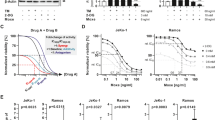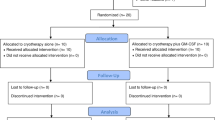Abstract
Receptor-recognized forms of α2-macroglobulin (α2M*) bind to cancer cell surface GRP78, which functions as a signaling receptor promoting proliferation and survival. Patients with prostate, ovary, and skin cancer may develop auto-antibodies to the α2M* binding site which are receptor agonists whose presence indicates a poor prognosis. By contrast, antibodies directed against the COOH-terminal domain of GPR78 (anti-CTD antibody), are antagonists which down regulate pro-proliferative signaling and upregulate p53. Unfolded protein response (UPR) signaling plays an important role in cell survival and proliferation as well as apoptosis. We, therefore, studied the effect of anti-CTD antibody on UPR signaling in 1-LN and DU-145 prostate cancer cells. Treatment of these cells, which express GRP78 on their cell surface, with this antibody significantly downregulated IRE1-α, PERK, and ATF6α-dependent UPR signaling. By contrast, the pro-apoptotic protein GADD153 was elevated. Anti-CTD antibody treatment also elevated apoptotic components, cleaved PARP-1, and Erdj5. In general, a two to threefold effect was observed for the parameters which were studied. These studies suggest that anti-CTD antibody induces growth inhibitory and pro-apoptotic effects by modulating UPR signaling in human prostate cancer cells.





Similar content being viewed by others
References
Wang M, Wey S, Zhang Y, Risheng Ye, Lee AS (2009) Role of the unfolded protein response regulator GRP78/BiP in development, cancer and neurologic disorders. Antioxid Redox Signal. doi: 10.1089/ars.2009.2485
Kim I, Xu W, Reed JC (2008) Cell death and endoplasmic reticulum stress: disease relevance and the therapeutic opportunities. Nat Rev Drug Discov 7:1013–1030
Malhotra JD, Kaufman RJ (2007) The endoplasmic reticulum and the unfolded protein responses. Sem Cell Dev Biol 18:716–731
Ma Y, Hendershot LM (2004) The role of the unfolded protein responsei n tumour development: friend or foe. Nat Rev Cancer 4:966–977
Kim R, Emi M, Tanabe K, MuraKami S (2006) Role of the unfolded protein response in cell death. Apoptosis 11:5–13
Wu J, Kaufman RJ (2006) From acute stress to physiological roles of the unfolded protein response. Cell Death Differ 13:374–384
Yoneda T, Imaizumi K, Oono K, Yui D, Gomi F, Katayama T, Tokyama M (2001) Activation of caspase-12 an endoplasmic reticulum (ER) resident caspase through tumor necrosis factor receptor-associated factor 2-dependent mechanism in response to ER stress. J Biol Chem 276:13935–13940
Rao RV, Peel A, Logvinova A, delRio G, Hermel E, Yokota T, Goldsmith PC, Ellerby LM, Ellerby HM, Bredesen DE (2002) Coupling endoplasmic reticulum stress to the cell death prognosis role of ER chaperone GRP78. FEBS Lett 514:122–128
Hitomi J, Katayama T, Eguchi Y, Kudo T, Taniguchi M, Koyama Y, Manabe T, Yamagishi S, Bando Y, Imaizumi K, Tsujimoto Y, Tokyama M (2004) Involvement of caspase-4 in endoplasmic Aβ-induced cell death. J Cell Biol 165:347–356
Harding HP, Zhang Y, Bertolotti A, Zeng H, Ron D (2000) Perk is essential for translational regulation and cell survival during unfolded protein response. Mol Cell 5:897–904
Zhang K, Kaufman RJ (2008) From the endoplasmic-reticulum stress to the inflammatory response. Nature 454:455–462
Lu PD, Harding HP, Ron D (2004) Translation retinitiation at alternative open reading frames regulates gene expression in an integrated stress response. J Cell Biol 167:27–33
Harding HP, Zhang Y, Zeng H, Novoa I, Lu PD, Calton M, Sadri N, Yun C, Popko B, Paules R, Stojdl DF, Bell JC, Hettmann T, Leiden JM, Ron D (2003) An integrated stress response regulates amino acid metabolism and resistance to oxidative stress. Mol Cell 11:619–633
Rutkowski DT, Kaufman RJ (2003) All roads lead to ATF4. Dev Cell 4:442–444
Ma Y, Hendershot LM (2003) Delination of the negative feedback regulatory loop that controls protein translation during ER stress. J Biol Chem 278:34864–34873
Rutkowski DT, Arnold SM, Miller CN, Wu J, Lu J, Gunnison KM, Mori K, Sadighi Akha AA, Raden D, Kaufman J (2006) Adaptation to ER stress is mediated by differential stabilities and prosurvival and pro-apoptotic mRNAs and proteins. PLoS Biol 4:2024–2041
Puthalakath HO, Reilly LA, Gunn P, Lee L, Kelly PN, Huntington ND, Hughes PD, Michalak EM, McKimm-Breschkin J, Motoyama N, Gotoh T, Akira S, Bouillet P, Strasser A (2007) ER stress triggers apoptosis by activating BH3-only protein BIM. Cell 129:1337–1349
Ewings KE, Wiggins CM, Cook SJ (2007) BIM and the pro-survival BCl-2 proteins. Opposite attract, ERK repels. Cell Cycle 6:2236–2240
Ley R, Ewings KE, Hadfield K, Cook SJ (2005) Regulatory phosphorylation of BIM: sorting out at the ERK from JNK. Cell Death Differen 12:1008–1014
Koh DW, Dawson TM, Dawson VL (2005) Mediation of cell death by poly(ADP-ribose) polymerase. Pharmacol Res 52:5–14
Heeres JT, Hergenrother PJ (2007) Poly(ADP-ribose) makes a date with death. Curr Opin Chem Biol 11:644–653
Fassio A, Sitia R (2002) Formation: isomerization and reductional disulphide bonds during protein quality control in the endoplasmic reticulum. Histochem Cell Biol 117:151–157
Thomas CG, Spyron G (2009) Erdj5 sensitizes neuroblastoma cells to endoplasmic reticulum stress-induced apoptosis. J Biol Chem 284:6282–6290
Ushioda R, Hoseki J, Araki K, Jonson G, Thomas DY, Nagata K (2008) Erdj5 is required as a disulfide reductase for degradation of misfolded proteins in the ER. Science 321:569–572
Fu Y, Lee AS (2006) Glucose regulated protein in cancer progression, drug resistance and immunotherapy. Cancer Biol Ther 5:741–744
Li J, Lee AS (2006) Stress induction of GRP78/BiP and its role in cancer. Curr Mol Med 6:45–54
Dong D, Ni M, Li J, Xiong S, Ye W, Virrey JJ, Mao C, Ye R, Wang M, Peri L, Dubean L, Groshen S, Hofman FM, Lee AS (2008) Critical role of the stress chaperone GRP78 BiP in tumor proliferation survival and tumor angiogenesis in transgene-induced mammary tumro devleopment. Cancer Res 68:498–505
Arap MA, Lahderiranta J, Mintz PJ, Hajiton A, Sarkis AS, Arap W, Pasqualini R (2004) Cell surface expression of the stress response chapterone GRP78 enable tumor targeting by circulating ligands. Cancer Cell 6:275–284
Misra UK, Gonzalez-Gronow M, Gawdi G, Hart JP, Johnson CE, Pizzo SV (2002) The role of GRP78 in α2-macroglobulin-induced signal transduction. Evidence from RNA interference that the low density lipoprotein receptor-related protein is associated with but not necessary for GRP78-mediated signal transduction. J Biol Chem 277:42082–42087
Misra UK, Pizzo SV (2008) Heterotrimeric Gα11 co-immunoprecipitates with surface-anchored GRP78 from plasma membranes of α2M*-stimulated macrophages. J Cell Biochem 104:96–104
Misra UK, Gonzalez-Gronow M, Gawdi G, Pizzo SV (2005) The role of MTJ1 in cell surface translocation of GRP78 a receptor for α2-macroglobulin-dependent signaling. J Immunol 174:2092–2097
Misra UK, Chu CT, Rubenstein DS, Gawdi G, Pizzo SV (1993) Receptor-recognized α2-macroglobulin-methylamine elevates intracellular calcium, inositol phosphates and cyclic AMP in murine peritoneal macrophages. Biochem J 290:885–891
Misra UK, Chu CG, Gawdi G, Pizzo SV (1994) Evidence for a second α2-macroglobulin receptor. J Biol Chem 269:12541–12547
Misra UK, Pizzo SV (1998) Binding of receptor-recognized forms of α2-macroglobulin to the α2-macroglobulin signaling receptor activates phosphatidyl inositol 3-kinase. J Biol Chem 273:13399–13402
Misra UK, Gonzalez-Gronow M, Gawdi G, Wang F, Pizzo SV (2004) A novel receptor function for the heat shock protein GRP78: silencing of GRP78 gene expression attenuates α2M*-induced signaling. Cell Signal 16:929–938
Misra UK, Deedwania R, Pizzo SV (2005) Binding of activated α2-macroglobulin to the cell surface GRP78 in 1-LN prostate cancer cells regulates PAK-2-dependent activation of LIMK. J Biol Chem 280:26278–27286
Misra UK, Deedwania R, Pizzo SV (2006) Activation and crosstalk between Akt, NF-kappa B and unfolded protein response signaling in 1-LN prostate cancer cells consequent to the ligation of cell surface GRP78. J Biol Chem 281:13694–13707
Goznalez-Gronow M, Cuchacovich M, Llanos C, Urzua C, Gawdi G, Pizzo SV (2006) Prostate cancer cell proliferation in vitro is modulated by antibodies against glucose-regulated protein 78 isolated from patient serum. Cancer Res 66:11424–11431
Mintz DJ, Kim J, Do K-A, Wang X, Zinner RG, Cristofanilli M, Arap MA, Hong WK, Troncoso P, Logothetis CJ, Pasqualini R, Arap W (2003) Finger printing the circulating repertoire of antibodies from cancer patients. Nat Biotechnol 21:57–63
Misra UK, Mowery Y, Kaczowka S, Pizzo SV (2009) Ligation of cell surface GRP78 with antibodies directed against its COOH-terminal domain upregulates p53 activity and promotes apoptosis. Mol Cancer Therap 8:1350–1362
Misra UK, Wang F, Pizzo SV (2009) Transcription factor TFII-I causes transcriptional upregulation of GRP78 synthesis in prostate cancer cells. J Cell Biochem 106:381–389
Bradford MM (1976) A rapid and sensitive method for the quantitation of microgram quantities of protein utilizing the principle of protein-dye-binding. Anal Biochem 72:248–254
Schewe DM, Aguirre-Ghiso JA (2008) ATF6-alpha-Rheb-mTOR signaling promotes survival of dormant tumor cells in vivo. Proc Natl Acad Sci USA 105:10519–10524
Ron D, Walter P (2007) Signal integration in the endoplasmic reticuloum unfolded protein response. Nat Rev Mol Cell Biol 8:519–529
Oyadomari S, Mori M (2004) Roles of CHOP/GADD153 in endoplasmic reticulum stress. Cell Death Differ 11:381–389
Hetz C, Bernasconi P, Fisher J, Lee A-H, Bassik MC, Antonsson B, Brandt GS, Iwakoshi NN, Schnizel A, Glicher LH, Koresemeyer SJ (2006) Proapoptotic BAX and BAK modulate the unfolded protein response by a direct interaction with IRIα. Science 312:572–576
Pinton P, Giorgi C, Siviero R, Zecchini E, Rizzuto R (2008) Calcium and apoptosis: ER-mitochondria transfer in the control of apoptosis. Oncogene 27:6407–6418
Suzuki T, Lu J, Zahed M, Kita K, Suzuki N (2007) Reduction of GPR78 expression with SiRNA activates unfolded protein response leading to apoptosis in HeLa cells. Arch Biochem Biophy 468:1–14
Rauschert N, Brandlein S, Holzinger E, Hensel F, Muller-Hermelink H-K, Vollmers HP (2008) A new tumor specific variant of GRP78 as target for antibody-based therapy. Lab Invest 88:375–388
Bellacosa A, Kumar CC, Di Cristofano A, Testa JR (2005) Activation of Akt kinases in cancer, implications, and therapeutic targeting. Adv Cancer Res 94:29–86
Dutta SR, Brunet A, Greenberg ME (1999) Cellular survival: a play in three Akts. Genes Dev 13:2905–2927
Shaw RJ, Cantley LC (2006) Ras PI(3)K and mTOR signaling controls tumor cell growth. Nature 441:424–430
Robey RB, Hay N (2006) Mitochondrial hexokinase, novel mediatros of antiapoptotic effects of growth factors and Akt. Oncogene 25:4683–4696
Robey RB, Hay N (2009) The “Warburg kinase” 2. Akt energy-metabolism interaction and oncogenesis. Semin Cancer Biol 19:25–31
Acknowledgments
This work was supported by National Institutes of Health Grant No. CA131235.
Conflict of interest
The authors declare that they have no conflict of interest.
Author information
Authors and Affiliations
Corresponding author
Rights and permissions
About this article
Cite this article
Misra, U.K., Pizzo, S.V. Modulation of the unfolded protein response in prostate cancer cells by antibody-directed against the carboxyl-terminal domain of GRP78. Apoptosis 15, 173–182 (2010). https://doi.org/10.1007/s10495-009-0430-y
Published:
Issue Date:
DOI: https://doi.org/10.1007/s10495-009-0430-y




